Aleksandar Vučić’s Serbia: Democracy as a New Name for Corruption
When Slobodan Milošević – “The Butcher of Balkans” as global media righteously labeled him – was overthrown, there were many in the West who claimed Serbia had found its soul. Twenty-two years later, 66 percent of Serbian citizens say, regarding the war in Ukraine, that “the position of Russia is closer to them.” Obviously, the country that is a candidate to join EU is still searching – maybe not its soul, but its path and goal for the future.
Somehow lost between West and East, democracy and authoritarianism, disturbing facts about the crimes committed in the recent Yugoslav wars and idealized picture of the self, Serbia gives a scary example of how slow and troubled transition can be, and how difficult it is to overcome the past.
In the present day, the most powerful political figure, who just started his second term as Serbia’s president, is Aleksandar Vučić, once the Minister of Information in Milošević’s regime, who is remembered for the brutality and efficiency with which he was eliminating independent media back then.
Speaking of media now, Vučić’s record is astonishing. As media monitoring by the Center for Research, Transparency and Accountability found, during May 2022 he occupied 70 percent of the total time dedicated to all politicians in the central newscasts of all broadcasters with national coverage in Serbia.
It’s like he never stops talking to the nation, mostly about the enormous economic growth, foreign investments, amazing infrastructural projects and the enemies –internal ones (the opposition) and external ones (usually, unidentified envious international subjects), who want to destroy all of that. Still, median salary in Serbia is below €500. Many people are too busy with making the ends meet to fight for their political rights and care about democracy. And there is a common saying in Serbian: “It can always get worse.”
A Corruptive Web of Clientelism
Even Vučić’s publicity advisors feel that such a massive media presence might backlash; people started noticing that he is literally everywhere, “even coming out of the fridge.” So, they created a disruptive ad for the election campaign in which Vučić really did walk out of a refrigerator, just to explain that he does this only to reach each and every citizen, and tell them all about Serbia’s countless successes.
Vučić is still the head of the Serbian Progressive Party, although under the Constitution the president is obliged to freeze his/her party membership during the mandate. The party officially counts about 750,000 members, which means that one in nine persons in Serbia is its member. By comparison, in the former Socialist Federal Republic of Yugoslavia, whose population was for times larger than present-day Serbia, the Alliance of Communists, the only legal political party, never had more than 900,000 members.
No other representative of Vučić’s party is perceived to have a significant political power – everyone is dispensable except of him.
It seems like it’s a normalized practice in Serbia that anyone who wants a job of any kind in the public sector, and sometimes even in the private companies that are dependent on political structures, that they simply must join Vučić’s party. And also, they have to do some friendly favors when needed.
A poisonously corruptive web of clientelism makes up an important part of the current regime’s strength. The party’s infantry gets mobilized in ensuring the “capillary votes”, and travelling across the country to attend the rallies.
“That guy did a favor to me. My wife got job through the party. It’s a trap, a mousetrap,” one of those party “activists” whose identity is protected, told the Center for Research, Transparency and Accountability. “You can’t get out of it. I’ve travelled to the rallies, pushed my friends to vote for the party… People are blackmailed – they get a job, but contracts only last for three months.”
A New Name for Corruption
One may wonder how it was possible, in the first place, that the notorious exponents of the criminalized, internationally isolated regime from the 1990s could ever be restored to power. It is the most complex question, for sure.
Vučić’s parties – once Serbian Radical Party, now Serbian Progressive Party – were building its strength, in large part, by criticizing corruption. Even now, 10 years after being reinstalled to power, on daily basis they keep mentioning the “yellow gang,” referring to the once ruling Democratic Party.
There were too many “transitional losers” in Serbia. Too many jobs got lost, too many big socialist enterprises were shut down. People couldn’t grasp the logic of privatization and a new economic model in which the factories where they had worked for decades were being sold for peanuts, destroyed, and replaced with shopping malls and luxurious residential condominiums. For many, democracy seemed just like a new name for corruption, inequality and a tremendous social injustice. And the populist, undemocratic forces were very eager to strengthen such perception.
On the other side, the war profiteers from the 1990s were turning into a new financial elite, strongly supporting every effort to prevent the society from facing the dark truth about the Yugoslav Wars. The trials at the International Criminal Tribunal for the former Yugoslavia in The Hague were presented as an attempt to burden the whole nation with collective guilt.
Western support for Kosovo independence also fueled the revival of nationalism and made the murky prospects of European Union membership even less attractive for many Serbian citizens, who are continuously subjected to strong Kremlin propaganda, which also contributes significantly to this big confusion.
Ironically, liberal politics was punished mostly because it was perceived to be corrupted, just to be replaced by a much more corrupted reality. In this new reality, there are significantly fewer media outlets daring to report on corruption, and fewer institutions daring to do their job and fight it.

